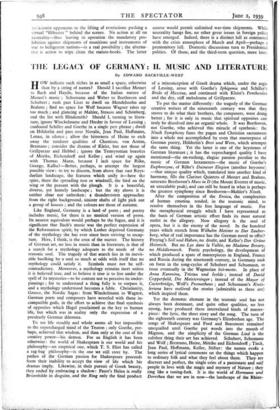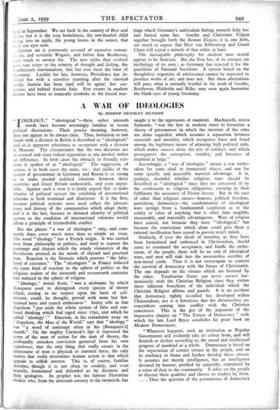'1'11E LEGACY OF GERMANY : II. MUSIC AND LITERATURE
By EDWARD SACKVILLE-WEST
HOW indicate such riches in so small a space, otherwise than by a string of names? Should I sacrifice Mozart to Bach and Haydn, because of the Italian nature of Mozart's music ; Schumann and Weber to Beethoven and Schubert ; rush past Liszt to dwell on Mendelssohn and Brahms ; find no space for Wolf because Wagner takes up too much ; and glancing at Mahler, Strauss and Schonberg, end the list with Hindemith? Should I, turning to litera- ture, ignore Winckelmann and Herder in favour of Lessing ; confound Schiller and Goethe in a single pert phrase ; dwell on Holderlin and pass over Novalis, Jean Paul, Hoffmann, Lenau, in silence ; allow the bitterness of Heine to etch away the tenderer qualities of Chamisso, von Arnim, Brentano ; consider the dramas of Kleist, but not those of Grillparzar and Hebbel ; ignore the Tennysonian beauties of Morike, Eichendorff and Keller ; and wind up again with Thomas Mann, because I lack space for Rilke, George, Kafka?—Better, perhaps, to attempt the largest possible view: to try to discern, from above that vast Ruys- daelian landscape, the features which unify it—here the spire, there the spreading tree or windmill, the bird on the wing or the peasant with the plough. It is a beautiful, diverse, yet homely landscape ; but the sky above it is neither clear nor unbroken: a thunderstorm approaches from the right background, sinister shafts of light pick out a group of houses ; and the colours are those of autumn.
Like England, Germany is a land of poets ; and poetry includes music, for there is no musical version of prose. Its nearest equivalent would perhaps be the fugue, and it is significant that Bach's music was the perfect expression of the Reformation spirit, by which Luther deprived Germany of the mythology she has ever since been striving to recap- ture. Here, I think, is the crux of the matter. The history of German art, no less in music than in literature, is that of a search for a mythology adequate to the needs of the teutonic soul. The tragedy of that search lies in its inevit- able baulking by a soul so much at odds with itself that no mythology could satisfy it. Symbols must not be self- contradictory. Moreover, a mythology remains inert unless it is believed true, and to believe it true is to live under the spell of its mysteries—to be content not to perceive its under- pinnings ; for to understand a thing fully is to surpass it, and a mythology understood becomes a fable. Christianity, Greece, the Nordic Sagas: from Winckelmann to Wagner, German poets and composers have wrestled with those in- compatible gods, in the effort to achieve that final synthesis of opposites which Hegel proclaimed as the key to human life, but which was in reality only the expression of a peculiarly German dilemma.
To see life steadily and whole seems all but impossible to the supercharged mind of the Teuton ; only Goethe, per- haps, achieved that wisdom, and then only at the cost of his creative power—his demon. For us English it has been otherwise: the world of Shakespeare is our world and his philosophy—an empirical one, which T. S. Eliot has called a rag-bag philosophy—is the one we still steer by. The pathos of the German passion for Shakespeare proceeds from their inability to accept the view of life which his dramas imply. Likewise, in their pursuit of Greek beauty, they ended by embracing a shadow: Faust's Helen is really Brtinnhilde in disguise, and the Ring only the final product of a misconception of Greek drama which, under the aegis of Lessing, arose with Goethe's 1phigenia and Schiller's Bride of Messina, and continued with Kleist's Penthesilea and the dry, stiff melodrama of Grillparzer.
To put the matter differently: the tragedy of the German creative writers of the nineteenth century was that they strove to do what their brothers, the composers, were doing better ; for it is only in music that spiritual opposites can truly be dissolved into an organic whole. It was Beethoven, not Goethe, who achieved this miracle of synthesis: the Ninth Symphony fuses the pagan and Christian sacraments into a whole not accomplished by even that masterpiece of German poetry, Htilderlin's Brot und Wein, which attempts the same thing. Yet the latter is one of the keystones of German literature ; it has the supercharged quality I have mentioned—the on-rushing, elegiac passion peculiar to the music of German hexameters—the music of Goethe's Euphrosyne, of Rilke's Duineser Elegien (another keystone) —that unique quality which, translated into another kind of harmony, fills the Clarinet Quintets of Mozart and Brahms, saturates Beethoven's Mass in D (the Mount Everest of music, an unscalable peak), and can still be heard in what is perhaps the greatest symphony since Beethoven—Mahler's Ninth.
After the composition of the Eroica, the complexities of human emotion tended, in the teutonic mind, to resolve themselves in the free language of music. For the metaphysical struggle which I have represented as the basis of German artistic effort finds its most natural outlet in the allegory. Now allegory is the soul of opera, but it is the enemy of the novel. In the hundred years which stretch from Wilhelm Meister to Der Zauber- berg, what of real importance has the German novel to offer?
Freytag's Soll und Haben, no doubt, and Keller's Der Grune Heinrich. But no Lys dans la Vallee, no Madame Bovary, no Middlemarch. Poetic psychology, the development of which produced a spate of masterpieces in England, France and Russia during the nineteenth century, in Germany took on form in the song-cycles of Schubert and Schumann, to issue eventually in the Wagnerian leit-motiv. In place of Anna Karenina, Tristan und Isolde ; instead of David Copperfield, Die Meistersinger ; instead of the Mayor of Casterbridge, Wolf's Prometheus ; and Schumann's Kreis- leriana have outlived the stories (admirable as these are) which inspired them.
Yet the demonic element in the teutonic soul has not always been dominant, and quite other qualities, no less strong, have produced three interrelated kinds of master- piece: the lyric, the short story and the song. The turn of the eighteenth century was Germany's Flirabethan age. The songs of Shakespeare and Ford and Beaumont remained unequalled until Goethe put words into the mouth of Mignon, and the simplicity of the German Lied is the subtlest thing their art has achieved. Schubert, Schumann and Wolf ; Brentano, Heine, Morike and Eichendorff ; Tieck, Jean Paul, Hoffmann, Keller, Stifter: the names evoke a long series of lyrical comments on the things which happen to ordinary folk and what they feel about them. They are discreet and perfect, the single cries of a passionate and naif people in love with the magic and mystery of Nature ; they ring like a tuning-fork. It is the world of Hermann und Dorothea that we are in now—the landscape of the Rhine- LA in September. We are back in the country of Brot and '11 :'in; but it is the cosy homeliness, the tow-headed child b..ing into an apple, the young lovers in the sunset, that 12,et our eyes now.
German art is commonly accused of excessive roman- 1 ,ism, and certainly Wagner, and before him Beethoven, 1..tve much to answer for. The new styles they evolved e vast scope to the nimiety of thought and feeling, the v,eathercock emotionalism, that has ever been the bane of Germany. Luckily for her, however, Providence has in- jected her with a ceaseless yearning after the classical (.)irth; Austria has been (and will be again) her cor- rective, and behind Austria Italy. Few events in modern history have been so ironically symbolic as the forced mar- riage which Germany's ambivalent feeling towards Italy has just foisted upon her. Goethe and Christiane Vulpus together brought forth the Roman Elegies; it is, one feels, too much to expect that Herr von Ribbentrop and Count Ciano will repeat a miracle of that order, at least.
The inescapable philosophy for modern man would appear to be Stoicism. But the Stoa has, of its essence, no mythology of its own ; so Germany has rejected it for the puerilities of National Socialism. A system based on the thoughtless urgencies of adolescence cannot be expected to produce works of art; and does not. But these aberrations will pass; what is eternally fruitful in the work of Goethe, Beethoven, Holderlin and Rilke, may soon again humanise the blank eyes of young Germany.











































 Previous page
Previous page